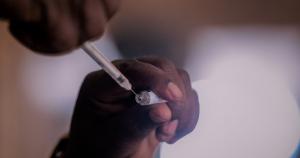Mauritania: champion of COVID-19 vaccination in Africa
Nouakchott - "Before, we had to go and find people willing to be vaccinated against COVID-19, now they come by themselves!" exclaims Mr Elhadi Sidi Mohamed, head of the vaccination site at the National Hospital Center in Nouakchott, Mauritania. "At the launch of the third vaccination campaign, we even had too many people here. Everyone wanted to be the first to be vaccinated.”
In early September, Mauritania became the 12th country on the continent to reach the World Health Organization (WHO)’s goal of vaccinating at least 10% of the population against COVID-19 by the end of September. As of 7 October, more than 580 000 people have been fully vaccinated against COVID-19, representing 12% of Mauritania's population of 4.5 million.
WHO advocated vigorously for Mauritania's inclusion in the COVAX priority country list and the country mobilized its own resources to procure doses of the vaccine through bilateral agreements. Mauritania received its first doses of the COVID-19 vaccine in December 2020 through a bilateral agreement with China. Previously, Mauritanian authorities had set a goal of vaccinating 63% of its total population, or 2.7 million people over the age of 18, by mid-July 2022.
The first vaccination campaign, launched in March 2021, was met with a cool reception by the population. When the second vaccination campaign was launched in June, only 30 000 people had been vaccinated. There was a lot of reluctance, and rumours about the danger of the vaccines were circulating on social networks. So much so that 120 000 doses of AstraZeneca vaccine were almost lost, as no one was able to find takers before the expiration date.
Vaccination sites close to the population
Health authorities became heavily involved and strongly intensified awareness campaigns, mobilizing the national media, religious leaders and youth associations in order to emphasize the importance of vaccination in the fight against the COVID-19 pandemic.
“The population prefers to be vaccinated in nearby facilities," explains Dr Mohamedou Mohamed Ahmed, Director of the Expanded Program on Immunization in Mauritania.
Thus, more than 900 vaccination sites were opened in public places, mosques, ministries, at the exit of cities, and at the entrance of bus stations. In addition, a devastating third wave prompted a dramatic increase in vaccinations.
"People get a lot of negative information about vaccines on the Internet. We had to explain why many of these claims were false. The public's behaviour gradually changed when they saw that vaccination was going well and that the people who were vaccinated were doing well," said Mr Elhadi, speaking from the vaccination center at the National Hospital Centre.
At the end of August, the Mauritanian government decided to make vaccination compulsory for state employees. Often seen as the country's elite, they have since served as an example and helped overcome beliefs about the safety of vaccines.
With support from WHO, health workers all over the country received vaccination training. The organization also provided staff and tools for vaccination data management as well as daily vaccination and drug safety monitoring. "Within just a few months, we have vaccinated more than 20% of the target population," says Dr Ahmed. "When the supply increases, the demand also increases."



